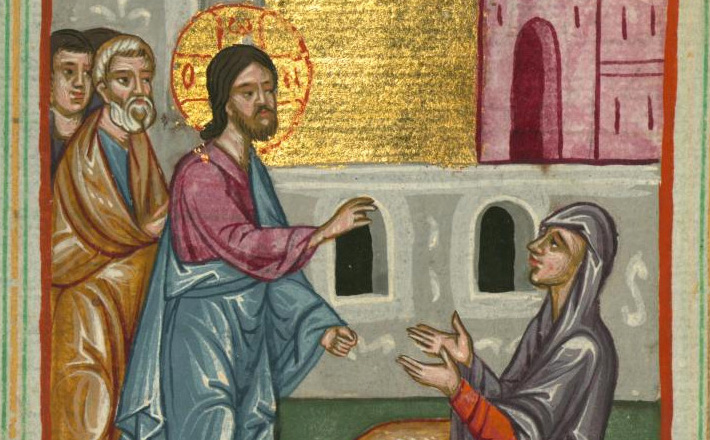Commentary on Isaiah 56:1, 6-8
Many people have sound reasons for disregarding or leaving church, not least of which is the insidious line-drawing done by Christians.
Favoring of our own judgment of who is in and who is out, we too often displace the Lord as sovereign of all that is. Whether it’s politics done in the name of “justice” or religion painted over with a thin veneer of “righteousness,” faith is disregarded in favor of exclusive quackery that displaces God as Lord of all. Not unlike the 6th century BCE when the Lord spoke through the prophet, so today God’s embrace is far wider than many Christians tend to imagine.
“Thus says the Lord … ” (Isaiah 56:1a) starts the third major movement in the book of Isaiah. Rather than getting caught up in trying to reconstruct the historical Sitz im Leben of Isaiah 56-66, consider reading this final movement of Isaiah as suggested by John Oswalt: Isaiah 56-66 “serves as a reprise of the opening themes of the Isaian symphony … they are written to show how the theology of chapters 40-55 fits into that of chapters 1-39.”1
While Isaiah 1-39 diagnoses the problem of Israel’s lack of trust in Yhwh, with foci on Israel’s faithlessness and Yhwh’s judgment, and Isaiah 40-55 provides a witness to God’s redeeming disposition (e.g. “Comfort, O comfort my people, says your God. Speak tenderly to Jerusalem … ”) and promise to restore, Isaiah 56-66 returns to a basic question: With the diagnosis and the renewed promise both in view, what now?
The first movement in this “what now?” is Isaiah 56.1-8. It addresses the reality that God’s blessing spills over the boundaries assumed by God’s people — the insiders.
Reread Isaiah 55 as the segue into this Sunday’s pericope. In particular recall:
Incline your ear, and come to me; listen, so that you may live. I will make with you an everlasting covenant, my steadfast, sure love for David. See, I made him a witness to the peoples, a leader and commander for the peoples. See, you shall call nations that you do not know, and nations that do not know you shall run to you, because of the LORD your God, the Holy One of Israel, for he has glorified you (Isaiah 55:3-5).
Note that central to the reestablishment of this everlasting covenant with David2 is that the covenant will spill over to “nations that you do not know.” The covenant with David as the everlasting covenant is transformed from one of safety from enemies toward their welcome (2 Samuel 4:11b).
And so this third movement of Isaiah 56-66 begins by exploring the spillage of the everlasting covenant against the backdrop of the religious practice of drawing lines in particular lines that exclude the foreigner and the eunuch. (Yes, the preacher is encouraged to include the whole of Isaiah 56:1-8, as the donut hole created by the lectionary weakens the force of the text.)
Note that the strong language used here is not about offering an “olive branch” to the “other.” This is not about some kind of associate membership.
To the eunuch who keeps Sabbath, the Lord promises full inclusion, recognition better than that given to a son or daughter, and “an everlasting name which shall not be cut off.” To the foreigners who keep Sabbath, these the Lord will bring into His presence, make them joyful, and accept their offerings. This is not peripheral inclusion. Rather, the Lord invites from the margins to the center of the covenant and to the center of Israel’s cultic life and worship.
It is pretty clear in Scripture that eunuchs are not permitted to enter into the assembly of the Lord3 and that foreigners are an abomination.4 Yet the Lord flips this up-side-down. For those who keep Sabbath. That is, for those who live in the everlasting covenant, the house of the Lord is open. Why? “ … for my house shall be called a house of prayer for all peoples. Thus says the Lord GOD, who gathers the outcasts of Israel, I will gather others to them besides those already gathered” (Isaiah 56:7b-8).
So it is that the Lord’s “steadfast and sure love for David” spills over into the world. The everlasting covenant is not about exclusion. It is about inclusion. Radical inclusion. An inclusion so radical that it reinterprets Scripture.
This Isaiah text resonates well with the gospel for today, Matthew 15:10-28, in that Jesus challenges established boundaries that some might consider both “just” and “righteous” (cf. Isaiah 56:1b).
Consider rereading John 5 in preparation for preaching Isaiah 56:1-8, especially in relation to this radical inclusion that reinterprets Scripture, in particular keeping Sabbath, the very thing that Isaiah 56:1-8 uses as a common denominator of inclusion. Note that at the outset of the chapter Jesus breaks Sabbath and commands the now-healed fellow to do the same, and then at the end of the chapter he says: “If you believed Moses, you would believe me, for he wrote about me. But if you do not believe what he wrote, how will you believe what I say?” (John 5:46-67).
Lest any of us Christians think that we’ve finally discerned the boundaries of God’s “steadfast, sure love for David” or that we’ve fully discerned Gods justice and righteousness, Jesus calls us to himself and to his cross where any boundary that we Christians might want to construct around God’s steadfast, sure love are shattered.
Notes:
1 John N. Oswalt, The Book of Isaiah: Chapters 40-66 (NICOT; Grand Rapids: Eerdmans, 1998) 11.
2 Cf. 2 Samuel 7:4-17.
3 Deuteronomy 23:1: “He whose testicles are crushed or whose male member is cut off shall not enter the assembly of the Lord.”(RSV) Also, though more specifically directed to the descendants of Aaron, i.e., priests, cf. Leviticus 21:20b.
4 Cf. Leviticus 22:25, Ezekiel 44:6ff, Nehemiah 9:2. It should be noted that the place of the foreigners is slightly more complicated than eunuchs, because of some delineations between foreigners, e.g. Deuteronomy 23:3-8.


August 17, 2014